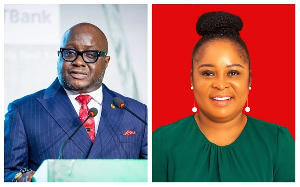The Bank of Ghana (BoG) has said it cannot go after money ‘doublers’ because there is no law that the central bank can rely on to arrest them.
Naa Anoumnyam Welbeck, an official at the Financial Stability Department of the Bank of Ghana, said for that to happen, the criminal codes in the country will have to be amended to give the central bank the power to arrest the perpetrators.
She told members of the Institute of Financial and Economic Journalists (IFEJ) at a training workshop in Koforidua on Sunday, December 1, that stakeholders on daily basis call on the BoG to act against the perpetrators.
However, “What law can we use to charge money ‘doublers’ when we arrest them?” she asked.
“When the person is arrested, his or her lawyer will come and the questions still remain, what charge of law will we use against the person?
“To be able to do that we will need to amend our criminal codes. The BNI, the Police and the EOCO will have to take that up,” Naa Anoumnyam Welbeck said.
Recently, the Minister of Information, Kojo Oppong Nkrumah, asked the BOG to take swift action on persons who are advertising on television stations that they have the ability to double money for their clients.
He has suggested to the central bank to state its position on the issue before matters come to a heat.
The minister was answering questions during the Upper East Regional Town Hall Meeting in Bolgatanga.
The issue of people claiming to have powers to double money to make people rich overnight on television is becoming a growing concern and the regulatory authorities appear not to be acting to avert future financial crisis.
The minister admitted the situation was worrying and said the regulators both in the financial and media sectors should not allow it to grow.
Correction: The name of the official at the Financial Stability Department of the Bank of Ghana was corrected following correspondence from the Institute of Financial and Economic Journalists (IFEJ). The article was also edited to reflect the institute's rejoinder disputing that Naa Anoumnyam Welbeck answered a question on the comments of the minister.
Click to view details



Business News of Sunday, 1 December 2019
Source: laudbusiness.com
No law to go after money ‘doublers’ – BoG
Entertainment

CEO of Caveman Watches ties the knot in private ceremony
Opinions














